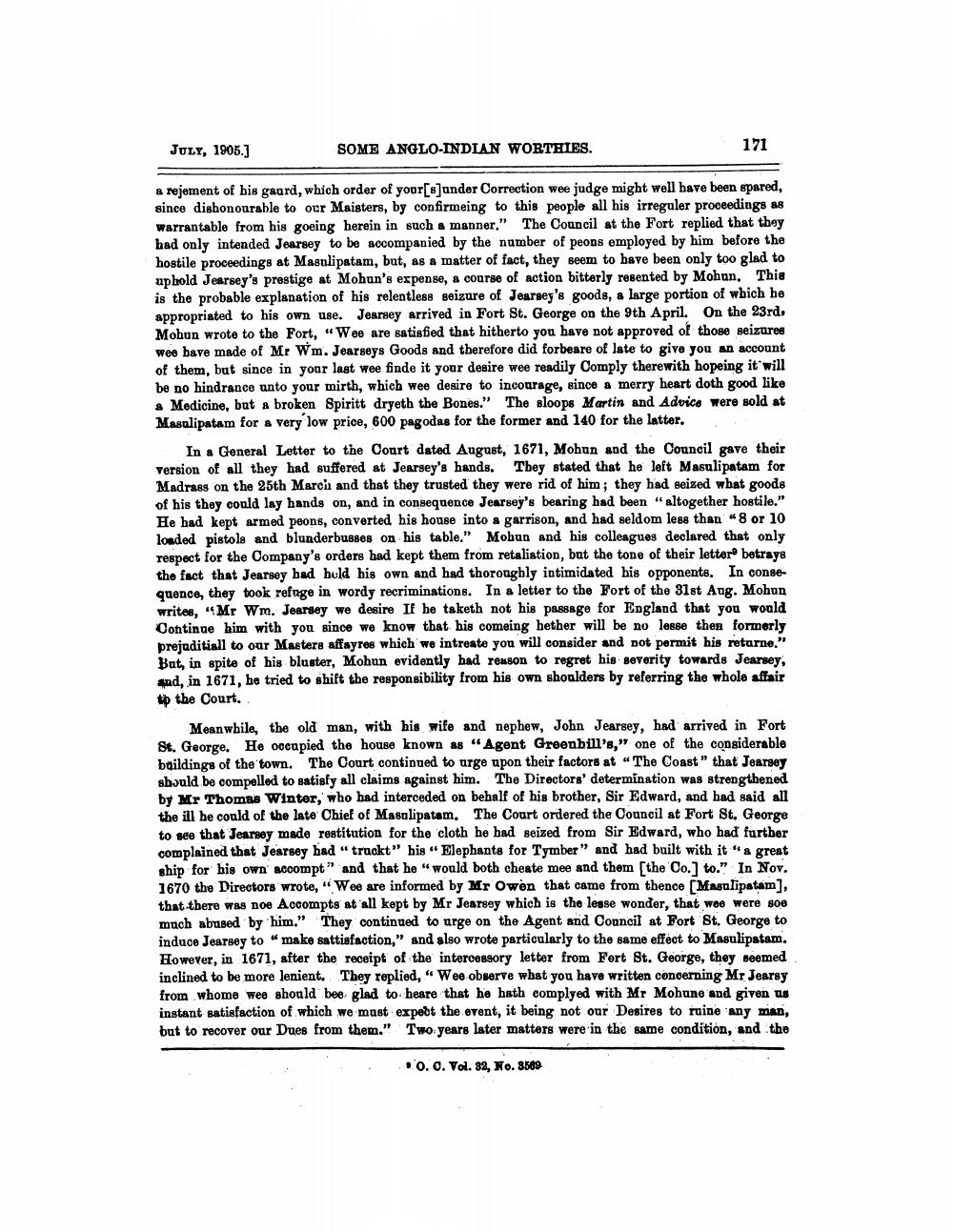________________
JULY, 1905.]
SOME ANGLO-INDIAN WORTHIES.
a rejement of his gaurd, which order of your[s]under Correction wee judge might well have been spared, since dishonourable to our Maisters, by confirmeing to this people all his irreguler proceedings as warrantable from his goeing herein in such a manner." The Council at the Fort replied that they had only intended Jearsey to be accompanied by the number of peons employed by him before the hostile proceedings at Masulipatam, but, as a matter of fact, they seem to have been only too glad to uphold Jearsey's prestige at Mohun's expense, a course of action bitterly resented by Mohun. This is the probable explanation of his relentless seizure of Jearsey's goods, a large portion of which he appropriated to his own use. Jearsey arrived in Fort St. George on the 9th April. On the 23rd, Mohun wrote to the Fort, "Wee are satisfied that hitherto you have not approved of those seizures wee have made of Mr Wm. Jearseys Goods and therefore did forbeare of late to give you an account of them, but since in your last wee finde it your desire wee readily Comply therewith hopeing it will be no hindrance unto your mirth, which wee desire to incourage, since a merry heart doth good like a Medicine, but a broken Spiritt dryeth the Bones." The sloops Martin and Advice were sold at Masulipatam for a very low price, 600 pagodas for the former and 140 for the latter.
171
In a General Letter to the Court dated August, 1671, Mohun and the Council gave their version of all they had suffered at Jearsey's hands. They stated that he left Masulipatam for Madrass on the 25th March and that they trusted they were rid of him; they had seized what goods of his they could lay hands on, and in consequence Jearsey's bearing had been "altogether hostile." He had kept armed peons, converted his house into a garrison, and had seldom less than "8 or 10 loaded pistols and blunderbusses on his table." Mohun and his colleagues declared that only respect for the Company's orders had kept them from retaliation, but the tone of their letter betrays the fact that Jearsey had held his own and had thoroughly intimidated his opponents. In consequence, they took refuge in wordy recriminations. In a letter to the Fort of the 31st Aug. Mohun writes, "Mr Wm. Jearsey we desire If he taketh not his passage for England that you would Continue him with you since we know that his comeing hether will be no lesse then formerly prejuditiall to our Masters affayres which we intreate you will consider and not permit his returne." But, in spite of his bluster, Mohun evidently had reason to regret his severity towards Jearsey, and, in 1671, he tried to shift the responsibility from his own shoulders by referring the whole affair tip the Court.
Meanwhile, the old man, with his wife and nephew, John Jearsey, had arrived in Fort St. George. He occupied the house known as "Agent Greenbill's," one of the considerable buildings of the town. The Court continued to urge upon their factors at "The Coast" that Jearsey should be compelled to satisfy all claims against him. The Directors' determination was strengthened by Mr Thomas Winter, who had interceded on behalf of his brother, Sir Edward, and had said all the ill he could of the late Chief of Masulipatam. The Court ordered the Council at Fort St. George to see that Jearsey made restitution for the cloth he had seized from Sir Edward, who had further complained that Jearsey had "truckt" his "Elephants for Tymber" and had built with it "a great ship for his own accompt" and that he "would both cheate mee and them [the Co.] to." In Nov. 1670 the Directors wrote, "Wee are informed by Mr Owen that came from thence [Masulipatam], that there was noe Accompts at all kept by Mr Jearsey which is the lesse wonder, that wee were soe much abused by him." They continued to urge on the Agent and Council at Fort St. George to induce Jearsey to "make sattisfaction," and also wrote particularly to the same effect to Masulipatam. However, in 1671, after the receipt of the intercessory letter from Fort St. George, they seemed inclined to be more lenient. They replied, "Wee observe what you have written concerning Mr Jearsy from whome wee should bee glad to heare that he hath complyed with Mr Mohune and given us instant satisfaction of which we must expect the event, it being not our Desires to ruine any man, but to recover our Dues from them." Two years later matters were in the same condition, and the
0. C. Vol. 82, No. 3509




